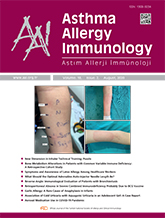


Objective: To evaluate the effectiveness of group trainings for using inhaler drugs with a spacer with a game (puzzle) after face-to-face training and the satisfaction of health care professionals in a second-line hospital.
Materials and Methods: Participants completed the post-training satisfaction questionnaire after both face-to-face and practical training. A cross-sectional, quasi-experimental study was performed.
Results: A total of 102 participants were included in the study. After the face-to-face training, the most common inhaler error was not shaking the inhaler tube before inhalation. The rate of participants who received a full score after face-to-face training (total 7 points) increased to 91.2% from 49% after puzzle practice (p <0.001). In addition, the increase in the total score after the face-to-face training was statistically significant (p<0.001). The majority of the participants (> 90%) assessed themselves as providing adequate inhaler training with a spacer and treatment to the patients. In addition, the participants thought that the puzzle was highly instructive, interesting, and a facilitator for learning.
Conclusion: The puzzle can be used as a complementary tool for face-to-face training and it seems to be useful as a visual education material. Large-scale and multicenter studies are needed to determine the effectiveness of puzzles in other disciplines.